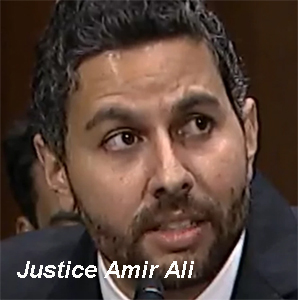





![]()
![]()
![]()
![]()
![]()
![]()
![]()
![]()
![]()
![]()
![]()
![]()
![]() You are here > Home > News Columns > What Authority Does the Judicial Branch have to Control U.S. Foreign Policy?
You are here > Home > News Columns > What Authority Does the Judicial Branch have to Control U.S. Foreign Policy?
The Executive Branch Must Act Within Its Authority
| Previous Lady Justice is Blind for a Reason |
What Authority Does the Judicial Branch have to Control U.S. Foreign Policy? | Next School Choice; Taxpayer funds for Private Schools | |
|
Published in The Post Newspaper March 23, 2025 Earlier this month the Supreme Court (SCOTUS) ruled 5-4 not to overturn a lower court ruling that forces the Trump Administration to release approximately $2 billion of USAID funding. But this apparent win for those opposing what Trump is doing should see this for what it is -- just a first procedural skirmish in what promises to be a larger constitutional battle; one which the SCOTUS will ultimately decide.  Upon taking office, Trump ordered a 90-day freeze of foreign aid in order to determine what grants remained effective and legitimate, properly disbursed, and in U.S. foreign policy and national security interests. Judge Amir Ali, a lame-duck appointment by Joe Biden, took an extraordinary measure of issuing a temporary restraining order (TDO) requiring payment at least for work allegedly already completed. Upon taking office, Trump ordered a 90-day freeze of foreign aid in order to determine what grants remained effective and legitimate, properly disbursed, and in U.S. foreign policy and national security interests. Judge Amir Ali, a lame-duck appointment by Joe Biden, took an extraordinary measure of issuing a temporary restraining order (TDO) requiring payment at least for work allegedly already completed. SCOTUS allowed the TDO to remain in place with Justices Roberts and Barrett voting with the majority. However, Justices Alito, Thomas, Gorsuch, and Kavanaugh issued a blistering dissent arguing the Biden-appointed judge has no authority to issue a TDO restraining how the executive branch spends funds. Alito contended the judicial branch doesn’t have the constitutional authority to force the executive branch -- which has the authority to establish US foreign policy – to spend funds on things the executive branch believes are not in line with the U.S. foreign policy. As the courts have recognized in the past, the Constitution vests the foreign policy/national security responsibility solely in the hands of the executive branch. Congress cannot use its funding power to subvert the Constitution’s separation of powers. For example, Thomas Jefferson refused to build gunboats for use on the Mississippi River while he was negotiating with Napoleon for the Louisiana purchase. Presidents Harry Truman and Dwight Eisenhower regularly refused to spend funds on weapons systems and military units they deemed unnecessary. Additionally the Constitution places on presidents alone the responsibility to "take Care that the Laws be faithfully executed." Arguably executing this duty may give a president the ability to achieve Congress’s spending directives while also saving money and adapting to new circumstances. Some contend forcing presidents to waste money while maintaining inferior government activities deprives Americans the very virtue of having a president in the first place. As Alezander Hamilton wrote in the Federalist Papers, the presidency was created so that a single man could act with "decision, activity, secrecy and dispatch." Even as President Trump’s efforts to remake the federal government through reduced and more efficient spending continue, he’s facing lawsuits over workforce reductions and the shuttering of offices. DOJ is defending his right to fire independent agency heads; agencies like the SEC which regulates stocks and bonds, the NLRB which controls public and private unions, and the FCC which regulates the telephone, television, cable and radio broadcasting industries. Trump has fired some of these board’s commissioners and officers. Unlike the careful enumeration of the limited powers of Congress, the Constitution does not list the authorities of the executive branch. Narrowly read, Article II of the Constitution doesn’t even grant the president the right to fire cabinet officers, only to appoint them with the advice and consent of the Senate. It does not explicitly require that those cabinet officers, or any inferior officers or employees even obey presidential commands. It does not explicitly give the president the power to set foreign policy or protect the national security. But from the very beginning the Federalist papers made it clear the founders read the Article II to vest the power in the president to control the executive branch and to exercise the great authorities to enforce the law and to protect the nation. It's from this that Trump’s fights, over spending and removal, flow. A President cannot control the execution of federal law if any inferior officer or even employee can choose to adopt his/her personal interpretation of the law or pursue a personal enforcement agenda. A president’s constitutional responsibility to see that the law is faithfully executed gives command over all executive branch personnel, from cabinet officials and heads of federal agencies on down. In Seila Law v. CFPB in 2020 Chief Justice Roberts said this authority gives the president the authority to fire Senate-confirmed officers, including those who, by statute, are given protection from removal. Trump’s opponents display their political weakness by rushing to the courts to resolve fights over spending and removal. The Constitution instead establishes the Congress as the branch best suited to respond to a president who has over-used his powers. The Congress can cut off funds, refuse to confirm officers, decline to pass legislation and ultimately impeach the president. Because Democrats have lost the national elections, they’re having difficulty coping with the fact the Congress won’t do their bidding. Meanwhile the Supreme Court will have little authority under the Constitution to interfere with Trump’s control of the executive branch and foreign and national security policies. |
|||
About the Authors and Columnists 2025 Bill Sargent and Mark Mansius have written over 300 guest columns and editorials over the last ten years for numerous publications and continue to do so. Bill lives in Galveston, Texas and Mark in St. Georges, Utah. Both Bill and Mark ran against each other in the 2012 Republican Primary for Texas Congressional District 14. Since then they have become close friends and colleagues. | |||
| . | |||